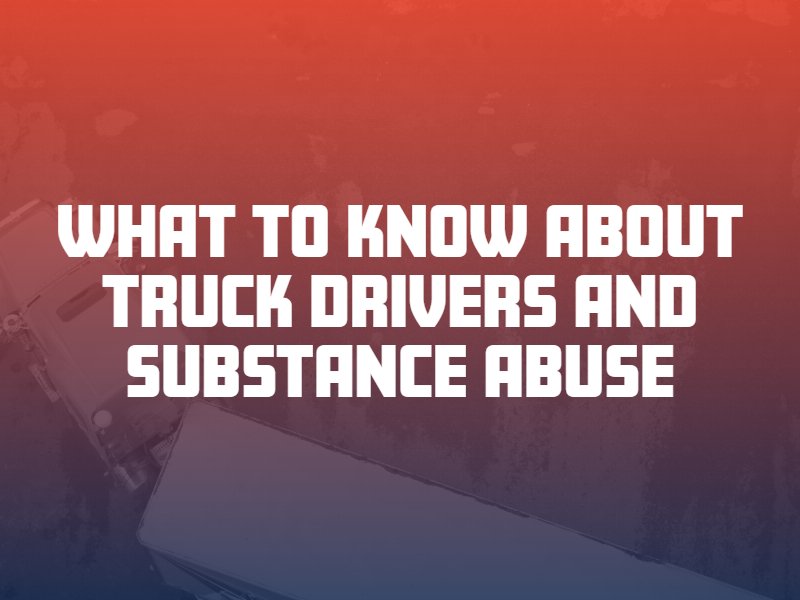Substance abuse causes thousands of car accidents in the U.S. each year. Driving while intoxicated (DWI) is the usage of drugs and/or alcohol before operating a motor vehicle. DWI is illegal in all 50 states. Commercial drivers may be more likely to suffer substance abuse disorders than typical motorists due to the nature of their jobs. Unfortunately, this can lead to many DWI accidents involving large trucks and other commercial vehicles.

Are Truck Drivers More Prone to Substance Abuse?
Most people assume the safety and prudence of truck drivers. After all, truck drivers are responsible for the safe operation of large and extremely heavy motor vehicles. Commercial trucks are dangerous weapons that drivers should operate with the utmost care and caution. Unfortunately, not all truck drivers take their duties seriously. Many intentionally break the rules while others turn to drugs or alcohol to cope with life on the road. Truck drivers can be more likely to develop substance abuse disorders than other drivers for a few different reasons.
- Sleep disorders and fatigue. Truck drivers are susceptible to sleep disorders and related drowsiness or fatigue. Long hours on the road, a stagnant lifestyle, obesity, smoking and sleeping odd times of the day can all contribute to sleep apnea, a common disorder among truckers. About 28% of truck drivers in the U.S. have sleep apnea. Sleep problems can lead to a truck driver using stimulant drugs, such as amphetamines, to stay awake or alert behind the wheel.
- Boredom and loneliness. Truck drivers often operate their trucks alone, sometimes for days at a time. It is common for truckers to experience depression, anxiety and other mental health conditions due to prolonged isolation and long hours on the road. Some truck drivers turn to substances to cope with their boredom and loneliness while driving. A trucker may use alcohol and/or drugs as a coping mechanism for undesirable work conditions.
- Lack of in-cab supervision. Truck drivers are their own bosses in a lot of ways. They do not have their employers or supervisors watching them while they work. Some truck drivers may take advantage of this leniency to do things they would not in a typical workplace setting, such as drinking or doing drugs on the job or right before work. Too much freedom on the road could contribute to substance use among truckers.
Addiction research found that 50% of truck drivers consume alcohol and 30% use amphetamines. The study also found that truck drivers in the U.S. had the highest percentage of positive alcohol tests out of all truckers in the world. In 2017, 4,657 fatal accidents involved commercial trucks. Many of these deaths happened due to intoxicated, reckless commercial vehicle drivers. Limited knowledge and lack of awareness about the connections between truck drivers and substance abuse contribute to this issue around the country.
How Can Truck Companies Help Prevent Substance Abuse?
Although a trucking company cannot supervise truck drivers 24/7, they can take certain steps to reduce the likelihood of truckers engaging in substance abuse at work. The Federal Motor Carrier Safety Administration offers rules and procedures for those in the trucking industry to help prevent DWI, for example. These include random drug and alcohol tests, mandatory testing after collisions, and rules against carrying alcoholic beverages in the truck while on duty.
It is a truck company’s legal responsibility to take appropriate and reasonable steps to prevent substance use and abuse among drivers, including following federal regulations. Negligent hiring, training or operational procedures could point to the truck company’s liability for a related truck accident. The company could also absorb vicarious liability for the actions of its driver if that driver caused an accident due to intoxication. Find out if a trucking company could be directly or vicariously liable for your recent DWI truck accident through a consultation with a personal injury lawyer in New Mexico.




